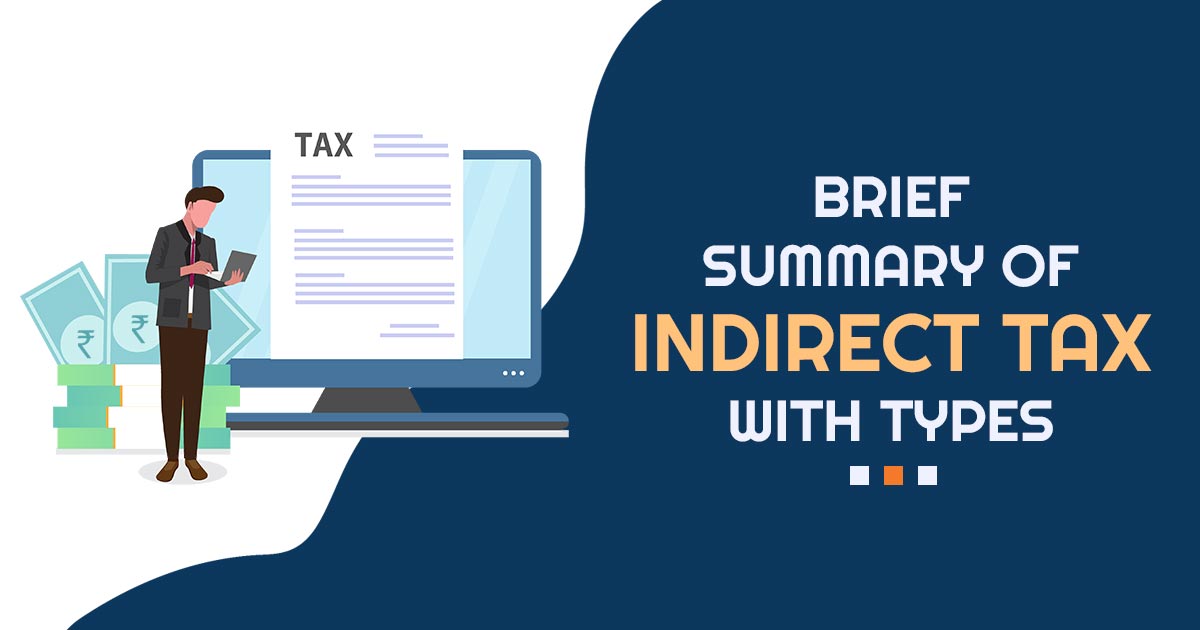
What is Indirect Tax
These types of taxes are paid on Consumption by the consumer, but they do not pay directly to the government (unlike income tax). For example, we pay VAT and other taxes on purchasing a product.
Types of Indirect Taxes in India
Here are several types of indirect taxes available in the Indian Constitution Bill. We define below:
A. Value Added Tax:
This type of tax is collected by the state government. For example, if we purchase a good, then we must pay an additional tax as Value Added Tax, to the government. The VAT rate is decided based on the nature of the item and the state.
B. Custom Duty and Octroi Tax:
This tax is levied on those goods that are imported into India from outside. The Customs Duty tax is paid at the port of entry in the country as the airport. This tax rate also varies over the nature of goods. The Octroi tax is charged on the goods entering the municipality.
C. Anti-Dumping Duty:
This tax is levied when the goods are exported at a price lower than their normal price by one nation to another nation. The Central government has imposed this tax.
D. Newly Implemented Indirect Tax (GST)
Goods and services tax is the most ambitious tax regime in India and also the latest indirect tax introduced in the Indian constitution. The significance of this tax scheme is that it will subsume all the other indirect taxes prevailing in the nation. The scheme has been introduced to make a shift in the Indian economy to reduce the cascading effects of the tax duties, thereby reducing overall inflation in the market.
There are various forms of GST which have been introduced, namely:
- SGST (State GST) – The SGST will be handled by the state government, in which all the taxes collected under the state provision will come under the SGST
- CGST (Centre GST) – CGST is a central GST that will be collected by the central government on account of every transaction having an interstate
- IGST (Integrated GST) – Integrated GST will be charged whenever a transaction occurs between two states, with a share of the state and centre, both with a specified proportion decided
Recommended: Meaning of SGST, IGST, CGST with Input Tax Credit Adjustment
E. Stamp Duty
Stamp duty is the tax imposed on immovable property in the state of India. The property located in the state is charged this type of tax by the state government. A stamp tax is appropriate on all legal documents.
F. Entertainment Tax
The state government levied the charge and shall apply to the products or transactions concerned with entertainment. Buying any video games, movie shows, sports activities, arcades, amusement parks, and other would count as some of the products on which the entertainment tax shall be imposed.
Features of the Indirect Tax
Below are some of the major specifications of the tax:
- Tax Payment: The seller furnishes the taxes to the government, and that shall be transferred to the consumer.
- Tax liability: The service provider or seller files the taxes to the government, and the liability shall be transferred to the consumer.
- Saving and investment: Recognising the facts that could motivate consumers to save and invest, thus suggesting that the taxes would be growth-oriented.
- Evasion: It is tough to evade tax since they are now executed directly through products and services.
- Nature: The nature of taxes is regressive, though with the execution of the GST, they would now be more progressive.
Benefits of the Indirect Tax
- Facilitate the collection- As compared to direct taxes, indirect taxes shall be collected easily. As indirect taxes would merely be collected during the time of purchases, the council is not required to worry about their collection.
- Convenience- The assessee would not get burdened by the indirect taxes and would find it convenient since they would be furnished at the time of purchase. Furthermore, the state council revealed it would be easier to charge taxes as they would get collected directly from the stores or factories that support securing the time, along with the effort.
- Equitable contributions- The indirect taxes would be concerned with the products and services. It stated that the basic needs draw the lower rates of tax, and the luxury items would be imposed with the higher tax rates, which assures that there would be an equal contribution.
- Collection from the poor- If the income of the person is below Rs 2.5 lakh per annum, then exemption from the income tax would be there, which rendered that they do not have any contribution to the government. As the levy of the indirect taxes is on sale, all individuals, irrespective of the income tax slab under which they fall, would contribute to the expansion of the economy.
Demerits of the Indirect Tax
Below are some of the disadvantages of indirect tax:
- Indirect Tax charges occasionally are cumulative – This is directed, for the point-based transaction system, the middlemen engaged would seem to levy their own service tax that leads to the rise in the whole cost of the product.
- Indirect Taxes have no friendly nature – Production costs shall surge if the taxes are imposed on the raw materials along with the goods, hence not permitting the industries to grow, since there is a limit on the competitive capacity.
- The nature of the indirect tax is regressive – for instance, the salt tax would be the same for both the poor and rich, but if the rich one loses to pay, there is the imposition of a higher penalty.
See Also: Direct Taxes